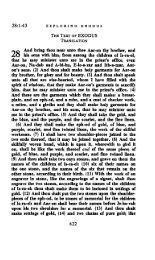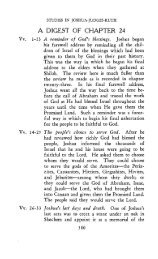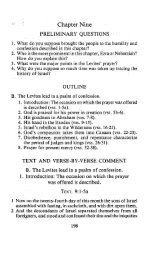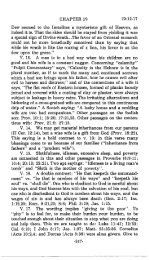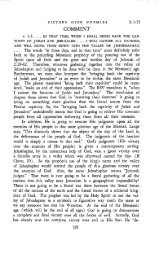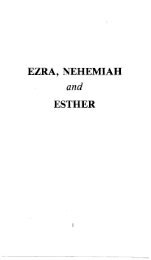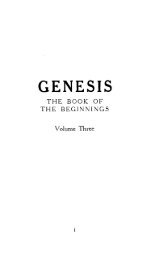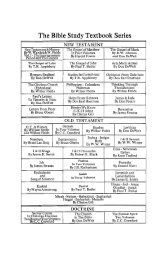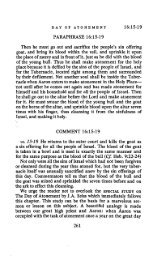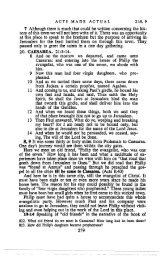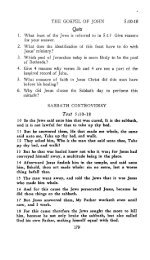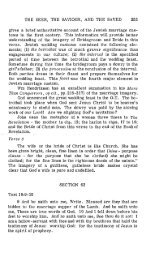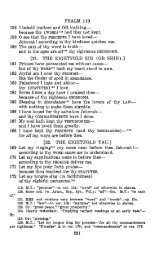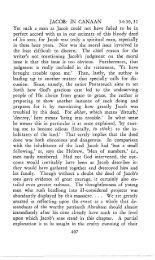Studies in the Psalms Vol 2 Part 2 - Only The Word
Studies in the Psalms Vol 2 Part 2 - Only The Word
Studies in the Psalms Vol 2 Part 2 - Only The Word
Create successful ePaper yourself
Turn your PDF publications into a flip-book with our unique Google optimized e-Paper software.
STUDIES IN PSALMS<br />
by <strong>the</strong>ir be<strong>in</strong>g called lawless (ver. 3) and practically certa<strong>in</strong> by<br />
<strong>the</strong> way <strong>the</strong>y speak of <strong>the</strong> God of Jacob (ver. 7). <strong>The</strong>ir do<strong>in</strong>gs<br />
are so wicked as to call for <strong>the</strong> vengecxnce of <strong>the</strong> Judge of all <strong>the</strong><br />
earth, and so protracted as to lead <strong>the</strong> sufferers to cry out How<br />
long, 0 Jehovah! <strong>The</strong>ir pride and arroigance strongly rem<strong>in</strong>d<br />
us of <strong>the</strong> haughty speeches of that “villa<strong>in</strong>” Rabshakeh, <strong>the</strong><br />
Assyrian general. Stanza IV. (vers. 8-11) <strong>in</strong>duces <strong>the</strong> belief<br />
that even some Israelites were <strong>in</strong> danger of fall<strong>in</strong>g away to <strong>the</strong><br />
foreigner, and needed to be severely reasoned with. Stanza V.<br />
(vers. 12-15) might have been a photograph for which Hezekiah<br />
himself sat; and goes far to persuade us that <strong>the</strong> actual writer<br />
of thi\s psalm was one of Hezekiah’s men, who could say of his<br />
master what his master would scarcely have said of himself. In<br />
Stanza V. (vers. 16-19) <strong>the</strong> voice of Hezekiah is aga<strong>in</strong> pla<strong>in</strong>ly<br />
heard: <strong>the</strong> draw<strong>in</strong>g is true to <strong>the</strong> life-Hezekiah has confronted<br />
<strong>the</strong> silence of death-has slipped-has had disquiet<strong>in</strong>g thoughts<br />
and restorative consolations. Stanza VI. (vers. 20-23) rem<strong>in</strong>ds<br />
us that all <strong>the</strong> while, beh<strong>in</strong>d <strong>the</strong> arrogant menaces of Rabshakeh,<br />
stood <strong>the</strong> <strong>in</strong>iquitous throne of Assyria, which, as cruel and Goddefy<strong>in</strong>g,<br />
could well be described by a godly Israelite as a throne<br />
of engulf<strong>in</strong>g ru<strong>in</strong>, Suffice it to rem<strong>in</strong>d ourselves of <strong>the</strong> signal<br />
way <strong>in</strong> which <strong>the</strong>se perfect tenses of prophetic certa<strong>in</strong>ty-haith<br />
become a lofty retreat, hath brought back on <strong>the</strong>mselves <strong>the</strong>ir<br />
trouble were at least typically fulfilled <strong>in</strong> <strong>the</strong> overthrow of Sennacherib.<br />
Such is <strong>the</strong> psalm. Is <strong>the</strong>re need any longer to ask,<br />
what it does here <strong>in</strong> this Sabbath-day Service of Song: as though<br />
<strong>the</strong> Jewish Sabbath were not, above all th<strong>in</strong>gs, a day of hallowed<br />
memories? On what pr<strong>in</strong>ciple it appears so <strong>in</strong>terlocked, as it<br />
dog here, with Jehovah’s Royal Advent, we may yet discover.<br />
After this, we need not concern ourselves fur<strong>the</strong>r with <strong>the</strong> question<br />
of authorship <strong>in</strong> its bear<strong>in</strong>g on this Sabbath-day Service of<br />
Song. With Hezekiah and Isaiah at work <strong>in</strong> its production, we<br />
are ready for any cont<strong>in</strong>gency which Hezekiah’s Chief Musician<br />
could suggest; s<strong>in</strong>ce we can conceive of no suggestion as to ei<strong>the</strong>r<br />
words or music, which Hezekiah and his godly helpers could not<br />
easily supply. But let us rapidly push forward this survey to<br />
a conclusion.<br />
Ps. 95 is remarkable for <strong>the</strong> facility with which, after a<br />
4-l<strong>in</strong>e <strong>in</strong>vitation to worship, it resolves itself <strong>in</strong>to two 10;l<strong>in</strong>e<br />
stanzas, <strong>the</strong> former joyous, and <strong>the</strong> later admonitory. As to<br />
<strong>the</strong> fitness of <strong>the</strong> latter to f<strong>in</strong>d place here,-with such waverers<br />
<strong>in</strong> view as <strong>the</strong> previoas psalm reveals (94:8-ll), it cannot be<br />
148



